Fiction Reviews
Little Bird of Heaven by Joyce Carol Oates
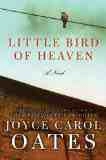
- Little Bird of Heaven: A Novel
- Ecco, 448 pp.
Broken Dreams
“How bleak was my puberty!”
No, this is not a quote from Joyce Carol Oates’s new novel, Little Bird of Heaven (it’s an inappropriately irreverent comment by Agnes Gooch in Auntie Mame), but it about sums up the gist of Little Bird of Heaven.
The setting is Sparta, a fictional city that, to put it politely, has seen better days:
The ruins of an American city devastated by war, a post-industrial American city in upstate New York – but what exactly had happened here? There was a strange glaring broken beauty to the rubble-strewn lot as of the ruins of antiquity but these were not ruins to be named, let alone celebrated. These were ruins lacking all memory, identity.
The time is the 1980s, when the manufacturing heart of the area has gasped its last and all that remains is the corpse. Divorce is endemic, drugs are a dime a dozen and the brutal murder of a promiscuous woman would barely be noticed.
Except, that is, when the woman is the winsome singer Zoe Kruller and the suspects include her husband, Delray, and her lover Eddy Diehl. And the police don’t know whom to arrest.
Who killed Zoe? It is a question that obsesses Eddy’s daughter Krista and Delray’s son Aaron, the innocent little birds who feature in one of Zoe’s signature songs:
Well love they tell me is a fragile thing
It’s hard to fly on broken wings
I lost my ticket to the promised land
Little bird of heaven right here in my hand
(For the multimedia-minded, the preface notes that this song has been performed by the Reeltime Travelers).
Krista is the first to give us her version of events. The white younger daughter of a hard-drinking, hard-handling father, she nevertheless favors him over her mother. He is her Daddy, and innocent, she is sure, of the crime.
Daddy, daddy, daddy; throughout the first half of the novel, Oates hammers the nails into the coffin of Krista’s childhood with painstaking thoroughness. Her beloved Daddy takes her to get ice cream from the sparkling Zoe:
Her hair was “strawberry blond” – crimped, flyaway, shoulder-length. Her eyebrows had been carefully plucked and filled in with eyebrow pencil, her pale lashes were inky with mascara. Her nose was a little too long, with a waxy tip, and wide nostrils. Her chin was a little too narrow. Yet her eyes were beautiful exotic: shades of amber like sherry at the bottom of a glass, or a certain kind of children’s marble, amber-glazed, changing its colors as you turned it in your fingers.
Her Daddy is suddenly no longer around anymore to work on the house. Her Daddy is sitting outside her school after her mother has taken out a restraining order.
In the meantime, Krista is growing up, emerging from her chrysalis as a shy, almost pathologically masochistic teenager. She joins the basketball team, where she is routinely pummeled by girls twice her size, and she foolishly agrees to meet with the “bad kids” at the depot.
Where she was hoping to see Aaron.
Krista does not really ever explain the reasons for her attraction to her damned twin (thankfully Oates is a writer, not a hack psychologist). But one could call it fate. Or bad luck.
For Aaron, as we see in the second half of the novel, wants nothing to do with her. He too believes implicitly in his father’s innocence and has a similarly complicated bond:
In fact, both father and son wore crash helmets on the Harley-Davison, when Delray believed that crash helmets were required. Not for brief teeth-jolting rides along the dirt lanes between cornfields where seven-foot cornstalks whipped in the wind and blew and slapped like forlorn living creatures as the cyclists rushed past. If the ride was longer and on an actual paved road – along Quarry to Post, and to the River Road for instance – with a stop at the Post Tavern – Delray strapped helmets on both his and Aaron’s heads and without protest Aaron bowed his head like a young fighter pilot, or an astronaut, being geared-up by his superior, on a mission that might end in a fiery death.
With both children, nihilism becomes a way of dealing with the chaos. Aaron is smart enough to know that there is no escape from the past, no escape from his father’s many problems and from this city of the damned, so he deals with it by violence (to feel alive) and work (to stay alive). That’s all he can do.
Krista and Aaron eventually do meet, in a shocking incident that leaves little space for spoken words. What Aaron does to Krista and how Krista responds – these are not things that can be easily classified. They are the actions and responses of broken souls. And broken souls don’t have the energy to behave appropriately.
In an earlier review, I tried to describe Andre Dubus III’s technique, the slow and careful accretion of details that form his fictional world. Oates has a similar style. Using Aaron and Krista as her observers, she is able to examine the initial crime from every angle. The grimy boundaries of Sparta are trod and retrod, a sense of claustrophobia growing with each new chapter.
Yet, somehow, even in such depressing circumstances, Oates’s imagination cannot be contained. Thoughts and descriptions spill off the page, so that you come away from Little Bird of Heaven with your fingertips dripping.
By this time, no doubt you’ll be asking whether all of this – the murder, the minute observations, my overuse of metaphors in trying to describe it all – is good or bad. Whether it is a novel you will want to go out and buy, or one you might wait to flick through in a secondhand stall.
I’m not sure I can answer that question. It’s a powerful novel, a novel of a great writer, but whether it is great in of itself, that I don’t know. Would the book have been better, tighter, if some of the details had been pruned? Would Oates be Oates without them?
Who knows? I can tell you one thing though. Krista and Aaron are not voices you’ll easily forget.
Elinor Teele is a freelance writer and photographer living in Massachusetts. In addition to reviews and essays, she writes short stories, novels and plays for children and adults. An adopted New Zealander, she holds a PhD in English Literature from the University of Cambridge, England.


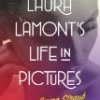

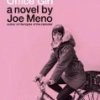

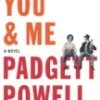

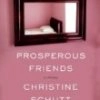





You must be logged in to post a comment Login